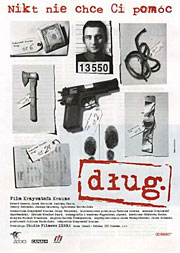 Dług
Dług
Poland, 1999, colour, 102 mins
I’ve been asked to write a short piece on the Polish director Krzysztof Krauze for the London Film Festival website (his latest film Saviour’s Square/Plac Zbawiciela is screening there on October 24 and 27), so I caught up with his 1999 breakthrough film The Debt. I knew absolutely nothing about it in advance other than what I could glean from the DVD artwork, a montage of black-and-white images of an axe, a gun, a rope, some dollar bills and a police mugshot. So it clearly wasn’t going to have much in common with My Nikifor (Mój Nikifor, 2004), the gentle study of a naive painter that’s the only other Krauze film I’ve seen to date.
Indeed not – although the beginning is leisurely enough, as we meet twentysomething business partners Adam Borecki (Robert Gonera) and Stefan Kowalczyk (Jacek Borcuch) and get an insight into their family lives, once they get involved with Gerard Nowak (Andrzej Chyra) things get much faster, tougher and nastier. Gerard seems friendly enough at first, offering to act as a business go-between. The deal fails to come off, so Adam and Stefan thank him for his time and assume that’s the end of it. But Gerard claims to have expenses, and would quite like to get them repaid…

…and that’s all I’m going to reveal about the plot, as this is the kind of film where the less you know in advance, the better. Suffice it to say that Gerard knows some exceptionally unpleasant people and his interest rate of $1,000 a day is slightly in excess of that charged by most lenders, and you’ll see why Adam and Stefan’s professional and personal lives are turned upside down – but what can they do, in the absence of any evidence?

The Debt is a real palm-sweater for the most part, brilliantly capturing that helpless drowning-in-quicksand feeling of being unable to cope with runaway debts while simultaneously trying to conceal them from relations and loved ones. I didn’t know that it was based on a true story until the closing credits, though the situation works so well as a metaphor for Poland in the chaotic atmosphere immediately following the end of Communism that this scarcely matters. There’s also a strong hint of Dostoyevsky’s Crime and Punishment in Adam and Stefan’s psychological torment, especially in the final scenes.
- Director: Krzysztof Krauze
- Producer: Juliusz Machulski
- Script: Krzysztof Krauze, Jerzy Morawski
- Camera: Bartosz Prokopowicz
- Editing: Krzysztof Szpetmański
- Design: Magdalena Dipont
- Music: Michał Urbaniak
- Cast: Robert Gonera (Adam Borecki); Jacek Borcuch (Stefan Kowalczyk); Andrzej Chyra (Gerard Nowak); Cezary Kosiński (Tadeusz Frei); Joanna Szurmiej (Basia); Agnieszka Warchulska (Jola); Przemysław Modliszewski (Gerard’s assistant); Krzysztof Gordon (Adam’s father); Sławomira Łozińska (Adam’s mother); Maria Robaszkiewicz (Basia’s mother); Edyta Bach (Joanna); Jakub Bach (Jurek); Joanna Kurowska (Ania); Jerzy Gudejko (doctor); Henryk Gołębiewski (builder); Katarzyna Tatarak (police officer)
I watched it courtesy of ITI Home Video’s Polish DVD, which was perfectly serviceable. The film itself is presented in what I assume is the correct widescreen aspect ratio – it’s non-anamorphic, but the picture is otherwise quite acceptable. The sound has a couple of glitches (unfortunately, there’s something about the main theme of Michał Urbaniak’s score that triggers a slight pulsing that sounds like an encoding error), but it’s not a serious issue. The subtitles are excellent: clear, idiomatic and properly synchronised, and I don’t recall any problems. Extras are Polish-only, but consist purely of the trailer, very brief biographies/filmographies and a list of awards won by the film.
Links
- Official website (in Polish only)
- IMDB entry
- Longer reviews courtesy of Central Europe Review (Wojtek Kość), Kinokultura (Michael Stevenson), Strictly Film School (Acquarello)
- Ewa Mazierska’s essay ‘Cinema of Hard Times: Individuals, Families and Society in Polish Contemporary Films’ (Canadian Slavonic Papers, Sep-Dec 2004) uses The Debt as one of her key examples.
- Article in The Warsaw Voice from 14 November 1999 that discusses The Debt in the context of late-1990s Polish cinema in general.
- Culture.pl’s entry on Krzysztof Krauze (in English) sets The Debt in the context of the rest of his career